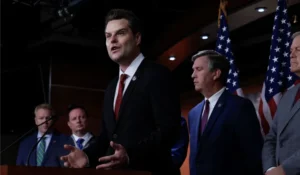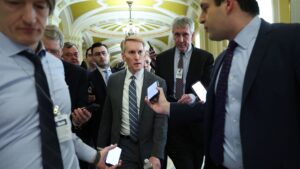The First Presidential Debate

After a year of one of the most closely followed Presidential election trails in history, Republican candidate Donald Trump and Democratic candidate Hillary Clinton finally came face to face on Monday night, September 26th, exactly fifty-six years after the first televised Presidential debate.
In 1957, two candidates who remained very different in their policies and natures made history on CBS when they appeared in front of the American people via televised live broadcast to debate for the office of presidency for the very first time. No one could have imagined the drastic impact it would have on polling trends. Nixon had been presumed as the definitive victor of the 1958 Presidency due to his extensive experience, however political analysts did not take into account the pure marketability of John F. Kennedy and severely underestimated the power of youth and charisma. Due to his charming performance, Kennedy went on to unexpectedly surpass Nixon in the polls, and became the unsuspecting winner of the election of 1957.
Ever since, televised Presidential debates have played a huge role in the process of American election politics. Especially in a race as unconventional as the current one, the American people look expectantly towards the first presidential debate, waiting to see how much, if at all, the polls will be swayed. A couple of months ago, the debate perhaps would have been less crucial, however the polls have tightened in the last few weeks. Whereas Clinton used to maintain roughly a 7 point lead on Trump, now she fluctuates within a 2 point range for the most part, according to Real Clear Politics. Unfortunately, those votes lost by Hillary, white college students, have been going towards neither candidate and as a result, were the ultimate prize during this first debate, yet the question is, who won them?
The answer is complicated. Most news channels have deemed the winner to be Clinton, but, considering what viewers expected of him, Trump also, in a sense, won. Personality wise, Clinton was drastically more extraverted, soliciting many laughs from the audience throughout the night. Yet, maturity wise, Trump conducted himself more presidentially than he arguably ever has. As far as policy issues go, both candidates brought their A-games.
First, Lester Holt, the NBC moderator of the debate, opened the forum with a question on how each candidate planned to put money back into the pockets of average Americans. Trump described his plan to reduce taxes, decrease company regulations, redraft unsatisfactory business agreements such as NAFTA, and decrease taxes on wealthy American business owners. Clinton’s argument could not be more polar. She believes in increasing taxes, increasing regulations on businesses, keeping NAFTA, an agreement that her husband had signed, and increasing taxes on the wealthy business owners in America. Consequently, it should be no surprise that Clinton immediately condemned Trump’s plan as “Trumped-up trickle-down” economics, referring to Reagan’s radical conservative economic policy that disproportionately favored the rich, and accused him of unsympathetic to the middle class. In response, Trump accused Clinton of proposing the largest tax increase in history and gave personal experiences of rich businessmen he knew to argue that high taxes are what is driving business and jobs out of the country.
Next, Holt questioned them on how they plan to bring jobs back to the country. Clinton revealed that she thinks it would be wisest to start investing in cleaner energy since the country that has that technological breakthrough will no doubt be rich. Trump quickly refuted her plan, saying that “our energy policies are a disaster” and that we shouldn’t be looking to invest money in such a risky task until we, as a country, are in a more stable financial condition. Instead, he proposes that the government begin to place heavy taxes on products that come from businesses that were once located in the United States, but now are not. This, he reasons, will stop American businesses from leaving, which is crucial for the economy right now since we are in the midst of a “bubble” right now, which implies we are bound to soon pop.
Perhaps the most crucial part of the night for winning over the dispassionate, undecided voters was when Holt asked Trump why he has not released his tax returns yet. Trump immediately spun the question around, declaring that he would release his tax returns as soon as Clinton released the thirty thousand emails that have conveniently gone missing from her private server. Significantly, both Trump’s tax returns and Clinton’s missing emails have become reasons for their opponents to question the two candidates’ characters. Clinton brands Trump’s reluctance to release his tax returns as an indicator that he could owe debts to foreign businesses and therefore be under their influence. Trump accuses Clinton of hiding incriminating information in her missing emails and argues that it was done “purposely” since she had her staff plead the fifth. With most modern American voters, personal attacks have proved more effective than attacks on policies. Consequently, voters will probably remember this specific exchange most clearly next to any humorous or especially offensive comments that were thrown out sporadically throughout the night.
Although both Clinton and Trump made multiple humorous comments and gestures throughout the night, perhaps the most memorable line resulted from Holt’s question on, more or less, how the candidates would fight ISIS. Clinton began outlining her plan, at which point Trump criticized her for her openness about her attack plan on her website, saying, “I don’t think General Douglas MacArthur would like that too much.” She rebounded by pointing out that he didn’t even have a plan, but Trump was merciless, continuing, “No wonder you’ve been fighting ISIS your entire adult life.” It was not the only instance Trump visibly got under Clinton’s polished demeanor, and it did not impede her from ruffling him up either. Besides getting him riled up by accusing him of having “stiffed’ many of his workers and accusing his suspicion of Obama’s birth certificate a “racist birther lie,” Clinton famously closed the night by listing a series of offensive comments he made towards women. He grew visibly heated, but, unlike himself, he did not really strike back at her. Instead, he informed the audience that he was going to say something very rude to Ms. Clinton, but he refrained himself due to the presence of her husband and daughter. This exchange, along with a few others, were why Clinton was characterized as having a stronger personality than usual, while, for some parts, Trump seemed to switch roles and take on Clinton’s usual demeanor, although some of his trademark passion was notably slipping through by the end.
As one can see, there are many factors behind a debate, especially one as complex and anticipated as this one. Some analysts claim that Clinton won, a few say Trump. Many analysts have concluded that both won, however, since the night will most likely not tip the undecided votes in either candidate’s favor, it is more accurate to label neither of them as the winner, and consider this debate as merely practice for the real deciding battle to come.








